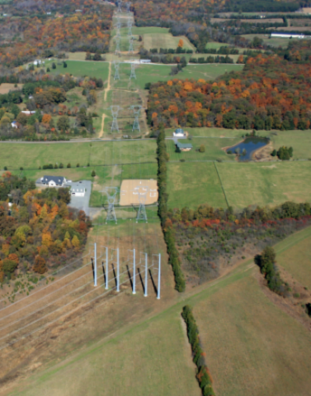Prince William could steal Loudoun’s title of Data Center Alley. But land use battles are raging.
Prince William County may be on its way to taking the “Data Center Alley” title from neighboring Loudoun County after initiating a plan to allow the development of data centers across 800 acres previously intended for agricultural use.
The idea originated from dozens of property owners along Pageland Lane in Gainesville who were motivated by growing development around them, including transmission lines and a 3 million square foot data center campus.
“We’re landowners whose corridor has changed, our lifestyle has changed, our safety has changed,” said Mary Ann Ghadban, a Prince William County property owner who spearheaded the plan.
She said Pageland Lane residents have been fighting development and cut-through traffic for more than a decade.
But after the previous Board of Supervisors voted two years ago to allow the development of the nearby Gainesville Crossing data center campus, Ghadban gathered other property owners to decide what to do next. In her retelling, the group discussed whether they wanted to remain “victims” of future development or see the growth as an opportunity for the county and themselves.
Ultimately, the property owners formally requested the Board of Supervisors to study changing the land use designation of their joint 801 acres from agricultural to one that allows data center development.
The request, which has come to be known as the Prince William Digital Gateway proposal, has divided county residents and raised questions about land use in the rapidly developing western edge of the county.
Digital Gateway
The Digital Gateway idea would transform Pageland Lane into a technology corridor for the development of data centers.
The study area, which has been expanded since the original proposal, covers 194 parcels on 2,139 acres and is adjacent to Conway Robinson State Forest and the Manassas National Battlefield Park. Pageland Lane would expand from two lanes to four on a 3.5-mile stretch as part of the proposal.
The Board of Supervisors agreed last summer to begin considering an amendment to its comprehensive plan, a document state law requires all localities to adopt, that would allow data centers to be sited in the Pageland Lane area. While comprehensive plans serve as a development guide for communities, they only provide recommendations for local governments and are not binding. A decision by county officials to ultimately sign off on the Digital Gateway proposal would not automatically allow such facilities in the region, but it would tilt the scales in favor of future project approvals.
Supporters said the proposal will generate jobs, lower tax rates, and improve schools. County officials have estimated it could generate $400.5 million in tax revenue.
Ghadban said during a January hearing that the decision is a “win-win” for the county.
“Yes, we as landowners will make money, but we are also going to be able to help Prince William County finally not be the junk room for Northern Virginia,” Ghadban said. “It’s time for Prince William County to get tax revenues for better jobs, better schools and parks.”
Long-time resident Nancy Harrover said the Gateway project could lead to a drop in taxes.
“Taxes were not bad when we first moved back, but they’ve climbed every year, and being on a fixed income is a problem,” she said in January.
Opponents, however, have argued that the new corridor will alter the area’s rural character, spoil the Manassas National Battlefield viewshed, overdraw the Occoquan Reservoir, which supplies drinking water to county residents, and strain the existing power grid.
Dominion Energy recently told Loudoun it might not be able to meet demands for power for more data centers, potentially leading to project delays. Additional substations and transmission lines would also be needed to power the potential data centers in Prince William, according to Dominion spokesperson Peggy Fox.
Most significantly, opponents say Prince William already has a designated area for data center development, known as a data center opportunity overlay district.
Currently, data centers cover 17.5 million square feet of land in the county, according to a May 27 letter from the Office of Executive Management to the board. In Loudoun County, commonly known as Data Center Alley because it houses the largest concentration of such facilities in the world, data centers occupy more than 25 million square feet, with another 4 million in development, according to local officials.
But in Prince William, interest in data centers may be outgrowing the allotted space. The May 27 letter notes that the current district would likely only accommodate two more site requests, as most proposals call for 100 acres. Generally, data centers require at least 30 acres of land. A recent analysis completed by the county in 2020 found a shrinking inventory of commercial and industrial zoned land that could be used for such facilities and determined that non-residential land was needed to rezone for data center use.
In a separate study, economic development consultancy Camoin Associates found that the county has another 15.7 million square feet of space that could be devoted to data center development. If totally built out, Prince William’s future data center footprint would eclipse that of Loudoun County.
Josh Levi, president of the Data Center Coalition, a trade association for the industry, said he believes the title “Data Center Alley” is shared by Northern Virginia. The study comes at a time where data centers are expanding into other states including Maryland.
“We are seeing businesses, governments and individuals pursuing all digital solutions, transitioning to online platforms and migrating to secure cloud services at a quicker pace.This is accelerating the need for additional data center capacity to support the transition,” Levi said. “And as [the public] has observed, the Northern Virginia market has a central role.”
Data Center Alley
Loudoun has benefited financially from the data center industry, which has generated close to half a billion dollars annually for the county over the past 15 years. The facilities make up about 50% of the county’s commercial portfolio, according to local officials.
The centers have also formed partnerships with local institutions such as Loudoun County Public Schools and Northern Virginia Community College, provided lunches for frontline workers during the pandemic and hosted events focused on innovation and technology.
In recent years, however, Loudoun has taken steps to become less reliant on data centers, largely due to declining revenues linked to depreciation of data center computer equipment, supply chain issues and less facility construction during the pandemic.
Last year’s tax collection on computer equipment was about $30 million less than anticipated for the current year, according to Loudoun’s finance report in July. County staff said the lower levy will have a negative impact on current revenues.
Consequently, county officials are looking toward other economic development opportunities. Recently, the county inked a deal to build a 36-court tennis campus estimated to bring in $8.5 million annually.
Loudoun and other counties in Virginia also face uncertainty about how much revenue they’ll be able to reap from data centers after the General Assembly passed legislation in 2022 changing how tax can be assessed. Currently, some data centers can obtain an exemption from retail sales and use tax if they meet certain criteria.
‘Greed and fear’
In Prince William, the effort to make more space for data centers has not only created a rift in the community, but triggered a race to recall local leaders.
Gainesville residents, the Coalition to Protect Prince William County and the Prince William County Republicans — through a resolution — make up most of the opponents to the Gateway project.
“It’s not for or against data center development,” said Elena Schlossberg, the coalition’s executive director. “We all use data, [but] it’s for data center development in the right location.”
Recall efforts, which are being led by the Coalition to Protect Prince William County, claim that Board of Supervisors Chair Ann Wheeler and Gainesville Supervisor Peter Candland have neglected their duties and misused their offices.
Candland, who owns property within the proposed corridor, initially voted against beginning the study to examine the Gateway project’s viability. But following his vote, he joined with other Pageland Lane property owners to back the project, saying he and his family were in a “no-win situation.”
“If the neighborhood was going to become a sea of data centers, we didn’t want that for our family,” Candland wrote in a letter to his constituents.
He later recused himself from any votes on the project.
Accusations against Wheeler have focused on financial interests. Since Prince William began considering the Gateway project, Compass Datacenters and QTS have filed rezoning applications for the acreage along Pageland Lane. Wheeler previously held stock in Blackstone Inc., which purchased QTS.
The Prince William County Planning Commission will hold a public hearing on the draft plan, although a date hasn’t been set. The project will then go before the board for another public hearing before a vote is scheduled.
“Prince William County has an excellent history of mitigating impacts of all types of development, and I expect that to continue as the county continues to grow over the next 20 years, no matter what the project is,” Wheeler said in an email to the Virginia Mercury.
Virginia Mercury is part of States Newsroom, a network of news bureaus supported by grants and a coalition of donors as a 501c(3) public charity. Virginia Mercury maintains editorial independence. Contact Editor Sarah Vogelsong for questions: info@virginiamercury.com. Follow Virginia Mercury on Facebook and Twitter.


